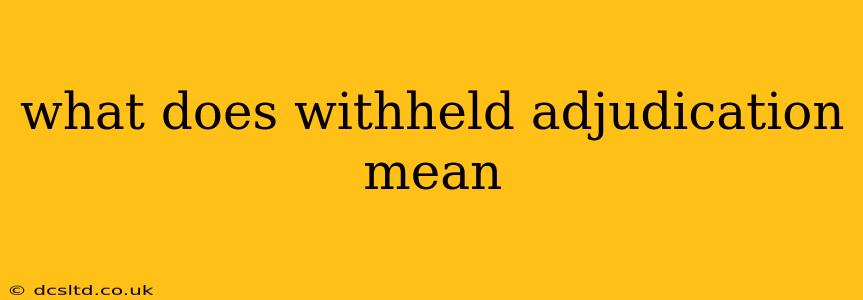Withheld adjudication, often used in the context of legal proceedings, particularly in cases involving first-time offenders or minor offenses, represents a specific outcome where a formal conviction isn't entered on a person's record. It's a crucial concept to understand, as it significantly impacts future legal consequences and personal circumstances. This post will delve into the meaning, implications, and nuances of withheld adjudication.
What Happens During Withheld Adjudication?
Essentially, withheld adjudication means the court postpones a formal finding of guilt. The defendant agrees to specific conditions, such as completing community service, attending counseling, or paying fines. If the defendant successfully fulfills these conditions within a predetermined timeframe (usually a probationary period), the charges are dismissed, and the case is effectively closed without a conviction appearing on their record. Failure to meet these conditions, however, can result in the court entering a formal judgment of guilt.
What Are the Benefits of Withheld Adjudication?
The primary benefit is avoiding a criminal record. This is particularly valuable for individuals who wish to maintain a clean record for employment, housing applications, professional licensing, or other opportunities where a criminal background check might be a barrier. It offers a second chance, allowing individuals to demonstrate their commitment to rehabilitation and responsible behavior.
What Are the Conditions of Withheld Adjudication?
The specific conditions imposed during withheld adjudication vary depending on the jurisdiction, the nature of the offense, and the judge's discretion. However, common conditions include:
- Probation: A period of supervised release during which the individual must adhere to specific rules and report regularly to a probation officer.
- Community service: Performing unpaid work for the benefit of the community.
- Fines: Monetary penalties imposed by the court.
- Restitution: Repaying victims for financial losses caused by the offense.
- Counseling or treatment: Participating in programs designed to address underlying issues contributing to the offense.
- Drug testing: Regular testing to ensure compliance with drug-free conditions.
How Does Withheld Adjudication Affect My Record?
If you successfully complete the terms of your withheld adjudication, the charges are typically dismissed, and no conviction appears on your criminal record. This means it won't show up in background checks, except in very specific circumstances where detailed information is requested from the court directly. However, it's important to note that some employers or licensing boards might still have access to court records, so it's crucial to be transparent and fully disclose the situation if asked.
What Happens if I Fail to Meet the Conditions of Withheld Adjudication?
Failure to comply with the conditions can lead to the court entering a formal judgment of guilt, resulting in a criminal conviction on your record. The consequences of a formal conviction can be severe and far-reaching, including potential jail time, fines, and limitations on future opportunities.
Is Withheld Adjudication the Same as Expungement?
No, withheld adjudication and expungement are distinct legal processes. While withheld adjudication prevents a conviction from appearing on a record in most cases, expungement is a separate process to formally remove or seal a criminal record after a successful completion of probation or after a certain period has passed. The availability of expungement also varies by jurisdiction and the type of offense.
Can I Get Withheld Adjudication for Any Offense?
No. The availability of withheld adjudication is determined by the severity of the offense, the defendant's criminal history, and the judge's discretion. It's usually reserved for first-time offenders and less serious crimes. More serious felonies are typically ineligible.
This information is for educational purposes only and should not be considered legal advice. If you are facing legal charges, it's crucial to consult with a qualified attorney to discuss your specific circumstances and options.
